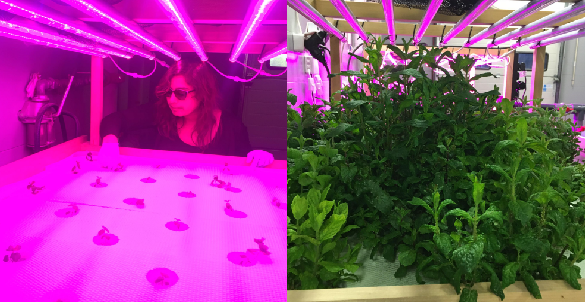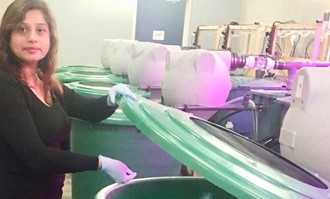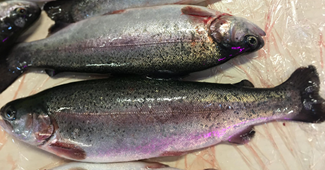Aquaponics: growing vegetables on the fish waste
Aquaponics is water efficient, sustainable, and environmentally friendly farming.
Indoor aquaponics farm development project is a collaborative work of Institute of Bioeconomy, JAMK University of Applied Sciences and University of Jyväskylä to promote doctoral research work and business for aquaponics farming. In the project, the business development section is funded by the Fisheries Local Action Group of Central Finland (Sisä-Suomen kalatalousryhmä). The doctoral research work is covered by other funding. The research work is focused on tackling of the challenges in aquaponics farming, to make it possible to develop an economically feasible aquaponics farm that ensures the environmental safety along with producing high quality fish and vegetables.

All about Aquaponics
Aquaponics is innovative rewarding, and exciting farming that gives you immense personal gratification. You can have indoor or outdoor aquaponics farm, or you can enjoy it as a hobby. Your small home aquaponics garden can provide you fresh salad and fish on your dining table. If you choose to sell your aquaponics products it can contribute to your income by selling fish and vegetables.
Your aquaponics system has many advantages for you and your environment. You are contented because you protect the environment and you are eating healthy, your food is chemical free and fresh. You are using 90-95% less water (ref 1 in your aquaponics farming as compared to the conventional vegetable and fish farming. You are mitigating the causes of environmental deterioration. In the conventional fish farming much water is wasted, and pollution is discharged to the environment, but in your aquaponics farm the water is cleaned and recycled back to the system.
Aquaponics is water efficient, sustainable, and environmentally friendly farming. You can grow the food all year round because you can control the environmental conditions yourself and you don’t need to worry about outdoor weather conditions. In aquaponics system you do not use the soil, it is less effort to grow plants in aquaponics than in soil. It is much faster to grow plants in aquaponics where you can be sure that your plants are flourishing because they are getting the necessary nutrients continuously with recirculating water.
Aquaponics can be done anywhere in a small room to a commercial scale farming, on a land that is not fertile, aquaponics needs only small land footprint.
Aquaponics is an ecosystem where no harmful chemicals (ref 2) are added for the nourishment of your fish and plants. Your aquaponics system work as a self sustained ecosystem where fish waste is converted to nitrates (ref 3) biologically and is used by plants. The use of pesticides and insecticides is discouraged in your aquaponics garden because it is unsafe for growing organisms, it can kill your fish and destroy the ecosystem. In aquaponics farming only safe and biological methods are used to support the growth and health of the growing organism.
In your aquaponics system fish and plants have symbiotic relationship where plants are cleaning the fish waste and fish is feeding the nutrients to the plants.
Aquaponics: potential in farming
The world’s growing population and increasing global food demand will impose to produce more and more food in coming decades. We require approaches to protect the environment and to deal with climate change. A profound change is needed to change our traditional farming methods to deal with world’s hunger, water scarcity, environmental deterioration, and scarcity of the fertile and productive land. Due to excessive farming our land is suffering from soil degradation (ref 4) and as a result the lands are not so fertile. Different methods such as application of excessive fertilizers and other chemicals (ref 5) is common practice in many countries. In Europe (ref 6) the farming is mainly affected by climate change. In Finland, field farming is affected due to warmer summers and heavy rains in the winter. The agricultural nutrients (ref 7) and fertilizers can flow to the waterways and millions of euros are needed each year for the water protection measures such as building of protective lanes and artificial wetlands between agricultural lands and water bodies.
The climate change is impacting the yield of the agriculture (ref 8), aquaculture (ref 9), and fisheries (ref 10). For growing fish, large quantities of water are needed, the conventional fish farming produce water pollution and farmers must deal with laws and regulations to deal with the pollution control.
The mankind is in a search of smart and innovative techniques to deal with these glitches and to grow high quality food, to deal with global food demands and to meet with the high food quality standards.
Aquaponics is a combined production of fish and vegetables in a recirculating water. Aquaponics offer an alternative crop and protein production way while minimizing the environmental impact. Aquaponics does not depend upon sowing and harvesting of crops seasonality. In aquaponics crops are grown without soil and does not require acres of fertile land or crop rotation. Aquaponics deals with many problems from farming and environmental point of view. Aquaponics could be a future of farming if we are ready to face the challenges and educating ourselves to find the solutions for these challenges.
Challenges in aquaponics
Aquaponics could contribute to address the serious problems as mentioned above but there are many challenges to develop this technique commercially. There are many parameters, components and interactions within the system that must be determined, optimized and solved to support the development of aquaponic farming commercially and worldwide. This can only be achieved, by aiming to combine the knowledge from the different sectors involved in aquaponics, by bringing together experts from different fields and exploring new directions in the scientific and business communities internationally.
References:
1: Can Reclaimed Water Be Used for Sustainable Food Production in Aquaponics? (nih.gov)
2: (PDF) Protecting plants from pests and diseases in aquaponic systems (researchgate.net)
4: 3.6 Soil degradation — European Environment Agency (europa.eu)
6: Agriculture — European Environment Agency (europa.eu)
8: The Effects of Global Climate Change on Agriculture
9: Climate change and aquaculture: potential impacts, adaptation and mitigation
10: Global fish production and climate change
Author: Faiqa Atique, PhD student at University of Jyväskylä, Project specialist (aquaponics) at JAMK University of Applied Sciences, Institute of Bioeconomy

